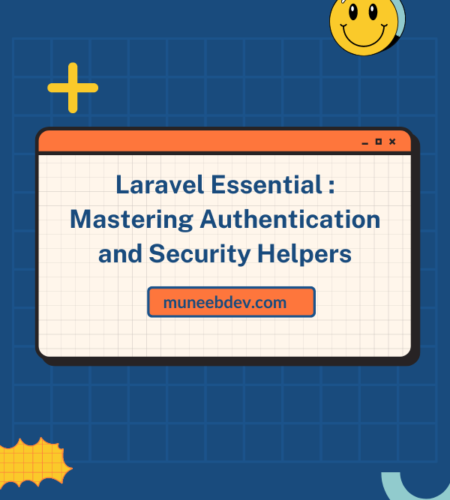In web development, ensuring robust authentication and security is paramount. Laravel, a popular PHP framework, provides several built-in helpers that make implementing these aspects both straightforward and efficient. In this blog, we’ll dive into four key Laravel helpers: auth(), bcrypt(), csrf_field(), and csrf_token(). These functions are essential for securing Laravel applications, managing user authentication, and protecting against common web vulnerabilities like CSRF (Cross-Site Request Forgery) attacks.
1. auth() – User Authentication Helper
Functionality:
The auth() helper provides a convenient way to access Laravel’s authentication services. It allows you to perform operations like checking if a user is logged in, retrieving user details, and even logging users out.
Use Case:
Use auth() in any part of your application where user authentication status needs to be checked or user information is required. It’s particularly useful in middleware, controllers, and views to deliver different responses or data based on the user’s authentication state.
Example Usage:
// Check if the user is logged in
if (auth()->check()) {
echo 'User is currently logged in.';
}
// Retrieve user information
$user = auth()->user();
echo 'Logged in as: ' . $user->email;
// Log out the user
auth()->logout();
echo 'User has been logged out.';
2. bcrypt() – Password Hashing Helper
Functionality:bcrypt() is a helper function that utilizes Bcrypt hashing algorithm to securely hash passwords. This is crucial for security best practices as it prevents storing plain text passwords in the database.
Use Case:
Use bcrypt() when storing user passwords, typically during the user registration or password update processes. It’s vital for any form handling user password inputs.
Example Usage:
// Hash a password from user input and store it
$user = new User;
$user->password = bcrypt('securepassword');
$user->save();
echo 'Password has been securely hashed and stored.';
3. csrf_field() – CSRF Protection for Forms
Functionality:
The csrf_field() helper generates an HTML hidden input field populated with a CSRF token. This token helps protect against CSRF attacks where unauthorized commands are transmitted from a user that the web application trusts.
Use Case:
Incorporate csrf_field() in every Laravel form that makes POST requests. This is essential for securing forms in your web applications against CSRF vulnerabilities.
Example Usage:
// Example of using csrf_field() in a Laravel form
echo '<form method="POST" action="/update-profile">';
echo csrf_field();
echo '<input type="text" name="username">';
echo '<input type="submit" value="Update">';
echo '</form>';
echo 'Form is secured with CSRF protection.';
4. csrf_token() – Accessing CSRF Token Directly
Functionality:
The csrf_token() function retrieves the CSRF token for the current session. This token is used to validate that the requests to the server are initiated by the authenticated user.
Use Case:
Use csrf_token() in situations where you need to include the CSRF token in JavaScript or in headers for AJAX requests. It’s especially useful when dynamically generating forms or making API calls from the frontend that require CSRF protection.
Example Usage:
// Include CSRF token in a JavaScript variable for AJAX requests
echo "<script>";
echo "var csrfToken = '" . csrf_token() . "';";
echo "</script>";
echo 'CSRF token is now accessible via JavaScript for secure AJAX calls.';
Conclusion
Laravel’s authentication and security helpers are designed to facilitate robust security practices with minimal effort. By utilizing these helpers, developers can secure their applications against common threats, manage user sessions effectively, and ensure that user data is handled securely. Whether you are managing user authentication or protecting your forms against CSRF attacks, these helpers provide a solid foundation for securing your Laravel applications.


Comments